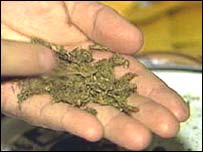
David Blunkett "agonised" over the decision to reclassify cannabis
|
Government plans to reclassify cannabis have prompted claims that the country's policy on drugs is confused and muddled.
Doctors fear it may send mixed messages to youngsters about the risks of taking the drug, while Tories say they would reverse the policy if they came to power.
But the home secretary says the idea is to send a credible message to young people about the relative dangers of drugs.
BBC News Online looks at different views on the cannabis debate.
Richard Kramer is head of policy at drugs and social care charity Turning Point, which supports the reclassification move:

We need to make clear that cannabis is less harmful than other drugs such as crack and heroin and also less harmful than amphetamines.
If people think harm is over-rated they are less likely to believe the risks associated with harder drugs and distinguish between them.
 |
 It's very important that we narrow the gateways, so that people who use cannabis do not come into contact with harder drugs
It's very important that we narrow the gateways, so that people who use cannabis do not come into contact with harder drugs

|
We are concerned, however, that there are some confusing messages about cannabis.
Reclassification isn't the same as legalising cannabis, it's still going to be illegal. It's still a Class C drug.
There will be a presumption against arrest for cannabis but police still retain the power to arrest in circumstances such as if someone is smoking in public, or with children under 18, or a public order offence.
There is a concern that there will be inconsistencies in the way it is policed. There is a risk that people will still be penalised.
There are guidelines from the Association of Chief Police Officers but police will interpret these in different ways.
The government has reclassified in relation to possession but not in relation to supply.
There is a fear that the same sort of person would sell cannabis as would sell heroin because the penalties for drug supply remain the same.
It's very important that we narrow the gateways, so that people who use cannabis do not come into contact with harder drugs like heroin.
There is also a need to still explain that there are health risks linked to cannabis; the effect on mood, paranoia and distress.
Treatment is the most useful tool against drug dependency.

Tim Summers is a member of Cannabis Action London and on the Green Party's Drugs Group:

It's a timid, and belated, step forward but it doesn't solve the civil rights issue about cannabis.
Being relatively safe, safer than tobacco, alcohol and crossing the road, we believe it is a person's human right to be able to use cannabis.
 |
 The reclassification is such a timid step, it just extends the grey area we have now into law
The reclassification is such a timid step, it just extends the grey area we have now into law

|
There are many uses for cannabis, not just as a recreational drug, but as a reliever of stress, a reliever pain and as a fuel, a textile and for building materials.
We think that the insinuations that cannabis has a link to mental illness and schizophrenia are a gross distortion.
There's no proven link.
Cannabis is innocent until proven guilty.
But cannabis isn't suitable for everybody - it is not suited to lots of people for lots of reasons and particularly people with mental health problems.
With regard to the legal position, because the reclassification is such a timid step, it just extends the grey area we have now into law.
It will cause all sorts of problems.
So we are continuing the fight to get cannabis legalised.


~RS~q~RS~~RS~z~RS~27~RS~)